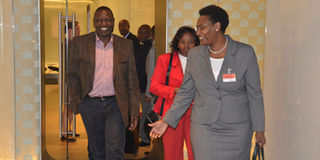ICC judges allow appeal on Ruto trial attendance

Deputy President William Ruto (left) and his wife Rachel Ruto are received by Kenyan ambassador to The Netherlands Makena Muchiri (right) at the Schipol Airport May 13, 2013. Mr Ruto was in The Hague to attend ICC's status conference May 14, 2013. ICC judges have granted prosecutor Fatou Bensouda leave to appeal the decision excusing Mr Ruto from continuous presence at trial July 18, 2013. FILE
The International Criminal Court judges have granted prosecutor Fatou Bensouda leave to appeal the decision excusing Deputy President William Ruto from continuous presence at trial.
Trial Chamber V judges Robert Fremr and Olga Herrera Carbuccia allowed Ms Bensouda's application to appeal the decision reached by the same court saying it could affect the expeditious conduct of the trial.
However, Chile Eboe-Osuji dissented.
"The majority of the Chamber is satisfied that the resolution of the two Issues in the Impugned Decision during appeals proceedings has the potential to significantly affect the outcome of the trial as well as the fair and expeditious conduct of the proceedings and that therefore an immediate resolution by the Appeals Chamber may materially advance the proceedings," the judges said Thursday.
"For the foregoing reasons, the Chamber, by majority, Judge Eboe-Osuji dissenting, hereby grants leave to the Prosecutionto appeal the Impugned Decision on the First and Second Issue."
Last month, the Chamber allowed Mr Ruto to be absent from some hearings when his trial for crimes against humanity starts at The Hague-based court.
Strict conditions
However, the Trial Chamber judges gave a raft of strict conditions that he had to comply with.
The judges also declared that Mr Ruto’s new position in government would not guarantee him immunity from the actions of the court. Permission to miss some sittings could also be revoked and an arrest warrant issued should he fail to comply with the conditions.
The decision, which has no precedent at the ICC, was reached by Judges Chile Eboe-Osuji and Robert Fremr with Olga Herrera Carbuccia dissenting.
The judges also turned down Mr Ruto’s request to attend the entire trial through a video link, ruling that he must be personally present when required.
The court said that Mr Ruto will have to be present in court during the opening and closing statements by all participants, during testimony by victims and during judgment and sentencing.
“Today, 18 June 2013, Trial Chamber V (A) of the International Criminal Court (ICC) conditionally granted, by majority, the request of William Samoei Ruto to be excused from being physically present continuously throughout the trial, scheduled to start on 10 September 2013,” said a statement from the court.
Judges Eboe-Osuji and Fremr said that their decision was meant to strike a balance between the interests of the accused, the prosecution, the victims and the witnesses.
“The Chamber has endeavoured to strike a balance that protects all the different competing concerns.”
They then set out the hearings where the Deputy President must by personally present.
“Mr Ruto must be physically present in the courtroom for the entirety of the opening statements of all parties and participants, the entirety of the closing statements of all parties and participants, when victims present their views and concerns in person, and the entirety of the delivery of judgment in the case,” they ruled.
He will further be required to attend the “entirety of the sentencing hearings (if applicable), the entirety of the sentencing (if applicable), the entirety of the victim impact hearings (if applicable), the entirety of the reparation hearings (if applicable), and any other attendance directed by the Chamber”.
The trial of Mr Ruto and his co accused, former Radio presenter Joshua arap Sang is scheduled to start on September 10.




